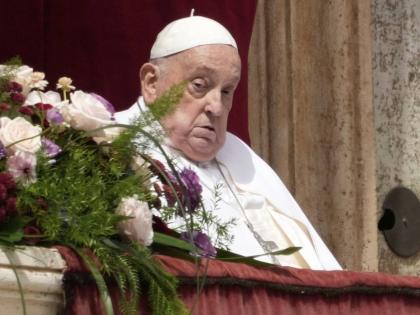Pope Francis Dies at 88: Who Will Lead the Catholic Church Next? Check Selection Process and Methods
By Lal Mohmmad Shaikh | Updated: April 21, 2025 18:44 IST2025-04-21T18:36:00+5:302025-04-21T18:44:24+5:30
Pope Francis, the head of the Roman Catholic Church based in Vatican City, passed away on Monday morning, April ...

Pope Francis Dies at 88: Who Will Lead the Catholic Church Next? Check Selection Process and Methods
Pope Francis, the head of the Roman Catholic Church based in Vatican City, passed away on Monday morning, April 21, at the age of 88. He had recently been discharged from the hospital after recovering from double pneumonia, which had severely affected his respiratory system. His death has now raised the question — Who will be the next pope to lead the Catholic Church, one of the oldest and largest religious institutions in the world with approximately 1.39 billion followers?
Who Will Succeed Pope Francis?
Pope Francis died after serving 12 years as the spiritual leader of the Catholic Church. His successor has yet to be chosen. The College of Cardinals, comprised of senior Catholic clergy — many of whom were appointed by Pope Francis himself — will be responsible for electing the new pope.
Eligibility
To be eligible, a candidate must be a baptised male Roman Catholic. Although, in theory, any Catholic man could be elected, for centuries, the cardinals have exclusively selected one from within their own ranks.
According to an Al Jazeera report, there are 240 cardinals worldwide. Professor Francesco Sisci has said, “It might be time for an African Pope,” citing Africa’s vibrant demographics and the Church's history of suffering and martyrdom on the continent.
Watch: Prof. Francesco Sisci on the potential successors to Pope Francis says, "It might be time for an African Pope. Africa has the most vibrant demographics, the population growth rate is the highest in the world...The African Church has suffered, and continues to suffer,… pic.twitter.com/NMdzYQKrYa
— IANS (@ians_india) April 21, 2025
"Africa has the most vibrant demographics, the population growth rate is the highest in the world. The African Church has suffered, and continues to suffer, greatly from persecution. It has many martyrs, as Islamic terrorists have been targeting and killing Catholic priests across the continent," Sisci stated further.
How Is a New Pope Chosen?
When a pope dies or resigns, cardinals under the age of 80 gather in what is known as the papal conclave. This secretive process is held inside the Sistine Chapel in Vatican City.
Currently, there are 138 cardinals eligible to vote, although the usual cap for papal electors is 120. The conclave remains locked until a new pope is chosen.
Also Read | Pope Francis’ Death: What Was His Net Worth and How Much Wealth Did He Leave Behind?.
How the Voting Works?
A candidate must receive a two-thirds majority to be elected.
Eligible cardinals take an oath of secrecy before voting.
Ballots are cast in secret.
Black smoke signals no decision.
White smoke announces that a new pope has been elected.
The elected candidate is asked whether he accepts. If he says “Accepto”, he chooses a new papal name.
The new pope is then introduced to the world with the declaration: “Habemus Papam” (“We have a pope!”).
He gives his first blessing from the balcony of St. Peter’s Basilica. The new pope becomes the spiritual leader of 1.3 billion Catholics and the head of Vatican City.
When Will the Papal Conclave Begin?
The conclave is expected to begin in the second or third week after the pope's death, following a nine-day mourning period. This time also allows cardinals from around the world to travel to the Vatican. In 2013, the conclave to elect Pope Francis began just 12 days after Pope Benedict XVI's resignation.
Who Are the Top Contenders?
Of the 138 eligible voters, 110 cardinals were appointed by Pope Francis, representing regions such as Asia, Africa, and Latin America — reflecting his vision of a globally inclusive Church.
The youngest cardinal elector is a 45-year-old Ukrainian clergyman based in Australia.
Also Read | Pope Francis, The Head of Catholic Church in Vatican, Dies at 88.
If the next pope is chosen from Africa or Asia, it could mark the first time in centuries that a pope hails from those regions.
Leading African candidates include:
Cardinal Peter Turkson of Ghana, former head of the Pontifical Council for Justice and Peace
Cardinal Fridolin Ambongo of the Democratic Republic of the Congo, Archbishop of Kinshasa
How Long Will the Process Take?
The election of a new pope can take several days to weeks, depending on how divided the College of Cardinals is. Four voting rounds take place each day. If no decision is reached after 33 rounds, a run-off vote is held between the two leading candidates.
Open in app